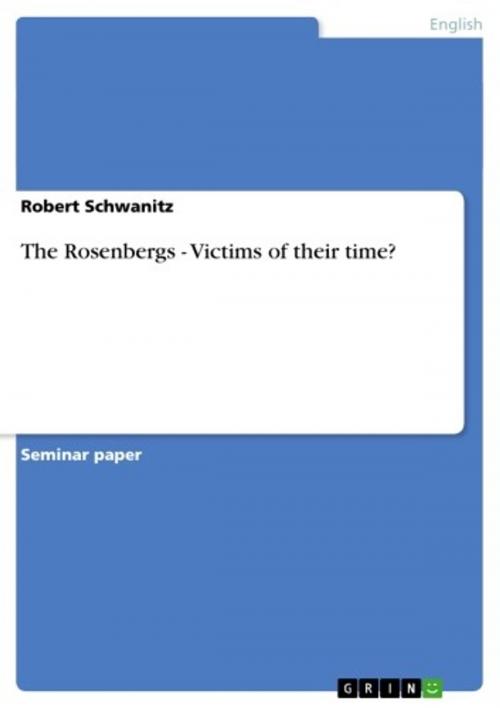The Rosenbergs - Victims of their time?
Victims of their time?
Nonfiction, Entertainment, Drama, Anthologies| Author: | Robert Schwanitz | ISBN: | 9783638357944 |
| Publisher: | GRIN Publishing | Publication: | March 14, 2005 |
| Imprint: | GRIN Publishing | Language: | English |
| Author: | Robert Schwanitz |
| ISBN: | 9783638357944 |
| Publisher: | GRIN Publishing |
| Publication: | March 14, 2005 |
| Imprint: | GRIN Publishing |
| Language: | English |
Seminar paper from the year 2003 in the subject American Studies - Culture and Applied Geography, grade: 1,0, Ruhr-University of Bochum (Fakultät für Amerikanistik/Anglistik), course: Jewish Immigrant Culture, 9 entries in the bibliography, language: English, abstract: Despite of having fought together against the Axis powers the Soviet Union and the US faced a clash of two totally different systems: Capitalism versus Communism. In his famous speech on March 3rd 1946 Winston Churchill, the Prime Minister of Britain, declared the 'Iron Curtain' had gone down between the East and the West marking the beginning of the Cold War. From that point on the two hegemonic countries in this conflict, the US and the Soviet Union, would watch each other's steps very closely. The US had one major military advantage though and that was the Atomic bomb. With the dropping of this weapon on Hiroshima and Nagasaki in Japan in August 1945 the world had to recognize the US as the first Atomic power in world history. In 1949 it was a shock to the US that the Soviet Union also had its first test of an Atomic bomb and therefore had to be recognized as an Atomic power. The politicians and the public had believed in the optimistic predictions of some scientist that the Soviet Union would at least need another twenty years to obtain Atomic weaponry. There had also been other voices but the picture of the uncapable Soviets fit better into the opinion of the US public during the time. The explanation for this misapprehension was not the failure of the experts but that the Soviets had obtained the knowledge through help from outside; through help from communist sympathizers inside the US. This is where the tragedy of the Rosenbergs begins. Julius and Ethel Rosenberg were executed on June 19th 1953 on the electric chair. They had been accused of a conspiracy to commit espionage. They left behind two orphaned sons and many questions to be asked. Was it an objective trial based on the principals of the legal system of the US? Or was it just another part of an anti communist hysteria and therefore heavily politically influenced? Was the case against the Rosenbergs really strong enough to issue the first ever death penalty because of espionage in the US after World War II? There are certainly more questions to be asked but these are the ones this work will try to focus on: To put the trial in a historic perspective and examine the evidence that was made public against the Rosenbergs.
Seminar paper from the year 2003 in the subject American Studies - Culture and Applied Geography, grade: 1,0, Ruhr-University of Bochum (Fakultät für Amerikanistik/Anglistik), course: Jewish Immigrant Culture, 9 entries in the bibliography, language: English, abstract: Despite of having fought together against the Axis powers the Soviet Union and the US faced a clash of two totally different systems: Capitalism versus Communism. In his famous speech on March 3rd 1946 Winston Churchill, the Prime Minister of Britain, declared the 'Iron Curtain' had gone down between the East and the West marking the beginning of the Cold War. From that point on the two hegemonic countries in this conflict, the US and the Soviet Union, would watch each other's steps very closely. The US had one major military advantage though and that was the Atomic bomb. With the dropping of this weapon on Hiroshima and Nagasaki in Japan in August 1945 the world had to recognize the US as the first Atomic power in world history. In 1949 it was a shock to the US that the Soviet Union also had its first test of an Atomic bomb and therefore had to be recognized as an Atomic power. The politicians and the public had believed in the optimistic predictions of some scientist that the Soviet Union would at least need another twenty years to obtain Atomic weaponry. There had also been other voices but the picture of the uncapable Soviets fit better into the opinion of the US public during the time. The explanation for this misapprehension was not the failure of the experts but that the Soviets had obtained the knowledge through help from outside; through help from communist sympathizers inside the US. This is where the tragedy of the Rosenbergs begins. Julius and Ethel Rosenberg were executed on June 19th 1953 on the electric chair. They had been accused of a conspiracy to commit espionage. They left behind two orphaned sons and many questions to be asked. Was it an objective trial based on the principals of the legal system of the US? Or was it just another part of an anti communist hysteria and therefore heavily politically influenced? Was the case against the Rosenbergs really strong enough to issue the first ever death penalty because of espionage in the US after World War II? There are certainly more questions to be asked but these are the ones this work will try to focus on: To put the trial in a historic perspective and examine the evidence that was made public against the Rosenbergs.















